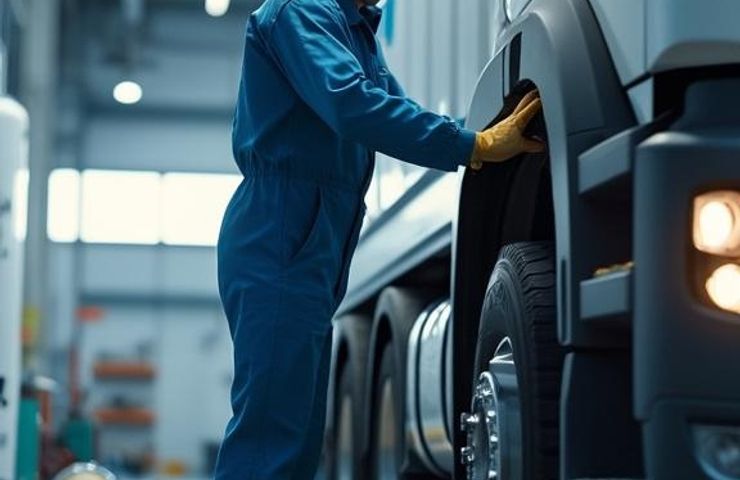
Australia’s First Hydrogen Fuel Cells Vehicle Service Training Launched in Victoria
August 18, 2025Victoria jumped right into the future of zero-emission technology and sustainable energy by rolling out Australia’s first accredited service training program for hydrogen fuel cells vehicle maintenance. This hands-on course, cooked up by Kangan Institute and Foton Mobility Distribution, got a boost from the Victorian Government’s Skills Solutions Partnerships program. It’s designed to arm auto techs with the nuts-and-bolts know-how they need to keep hydrogen fuel cell electric vehicles (FCEVs) humming. By tapping into top-notch training labs and Victoria’s existing hydrogen infrastructure, this initiative plugs a crucial skills gap as FCEVs gear up to move from test fleets to everyday duty.
Key Facts at a Glance:
- Program Launch: 12 August 2025 at Kangan Institute’s Automotive Centre of Excellence in Docklands, Melbourne.
- Partners: Kangan Institute, Foton Mobility Distribution, and the Victorian Government’s Skills Solutions Partnerships program.
- First Intake: 30 students signed up; classes kick off at the end of August 2025.
- Infrastructure Base: Leverages Victoria’s three renewable hydrogen refuelling stations, including the country’s only public station.
- Funding: Part of the $4.75 million package from the Victorian Government’s Economic Growth Statement.
Bridging the Skills Gap for FCEV Maintenance
The rise of Hydrogen Fuel Cell Electric Vehicles (FCEVs) for heavy-duty freight and passenger transport has outpaced traditional training. Most auto courses cover gas engines or battery-electric systems, but they gloss over high-pressure hydrogen storage, fuel cell stack troubleshooting, and specialized safety steps. This new program fixes that with an eight-week course that splits 120 hours between theory and hands-on work:
- 60 hours in the classroom, diving into hydrogen chemistry, fuel cell basics, and safety rules
- 60 hours of lab workshops, covering high-voltage systems, pressure testing, and diagnostic gear
- Build-and-break sessions on fuel cell stacks plus simulation-based fault-finding drills
- Field trips to live refuelling stations to tackle real-world service scenarios
- Risk management modules on PPE, gas detection tools, and compliance protocols
Seasoned instructors from Kangan lead the charge, with guest spots from Foton Mobility Distribution engineers to keep the content grounded in fleet maintenance realities. Graduates walk away with a nationally recognized accreditation that shouts competency in fuel cell technology and high-pressure system upkeep. The course even weaves in case studies—think membrane wear, seal leaks, and diagnostic puzzles—all drawn from Foton’s day-to-day data, so technicians learn to nip issues in the bud.
Public-Private Partnership & Funding Model
Underlying this program is the Skills Solutions Partnerships Model, where government grants fuel co-designed short courses. Here’s why it works:
- Industry Co-design: Foton Mobility Distribution and other stakeholders map out the must-have technical skills.
- Grant Funding: The Victorian Government chips in for curriculum development, specialist tools, and instructor training.
- Flexible Delivery: Blended learning means techs can upskill without walking away from their day jobs.
- Ongoing Review: Advisory groups tweak modules regularly to keep pace with evolving hydrogen vehicle tech.
Already, transport companies, logistics outfits, and vehicle makers are lining up to reserve spots, eager to lock in a steady stream of certified technicians. This model’s track record—boosting skills in digital manufacturing, renewable energy, EV charging, and hydrogen production monitoring—provides a rock-solid template for this next-gen training. It’s all about creating a nimble, industry-led approach to upskill Australia’s workforce in industrial decarbonization and beyond.
Victoria’s Hydrogen Infrastructure Advantage
Victoria isn’t just talking the talk—it’s got a trio of renewable hydrogen refuelling stations already online. The city’s public station in Docklands uses onsite electrolysis powered by renewable energy credits and pumps hydrogen at 700 bar. Two private stations support the key freight corridors out of Melbourne.
- Docklands Public Station: Open to all FCEV operators, complete with API-based dashboards that students use for live data analytics.
- Regional Freight Hubs: Let trainees experience heavy-duty refuelling operations in a real logistics setting.
By weaving the course into this live environment, students see the entire hydrogen infrastructure in action—from production and storage to distribution and safety checks. They even tap into the station’s real-time pressure and flow metrics, sharpening a data-driven approach to troubleshooting.
Strategic Impact and Industry Analysis
In 2023, Australia’s transport sector clocked up about 19 percent of national emissions, with heavy vehicles making a big dent. Battery-electric trucks work great for city runs, but long-haul freighters need fast refuels and lighter setups—where hydrogen fuel cells shine, offering up to 600 km range per fill and sub–10-minute fuelling times.
By training technicians now, Victoria aims to:
- Accelerate Decarbonisation: A ready service network removes a major hurdle for fleets switching to FCEVs.
- Create Skilled Jobs: The program pumps out high-wage, future-ready roles in the automotive field.
- Boost Industry Confidence: Accredited maintenance pathways cut perceived risks and shrink operational costs.
Elsewhere, Europe and Asia rolled out similar programs in 2022 and 2023, but Australia was missing a formal credential until now. Gayle Tierney, Victoria’s Minister for Skills and TAFE, says, “This program positions our workforce at the forefront of sustainable transport innovation.” Neil Wang, CEO of Foton Mobility Distribution, adds, “Working with Kangan Institute means our techs really get the nitty-gritty of hydrogen systems and after-sales support.”
Of course, hurdles remain: scaling up delivery, refreshing content as fuel cell technology advances, and keeping safety standards rock-solid. A second round of funding from Skills Solutions Partnerships is slated to tackle these capacity and curriculum updates later this year.
Looking Ahead: Scaling and Next Steps
With its first cohort of 30 students well underway, the program is already eyeing expansion. The Victorian Government’s Economic Growth Statement set aside extra funds for a second phase—think micro-credentials in advanced troubleshooting and station upkeep. Applications close soon, and successful providers will be named by late 2025. Word is that other states are keen to mirror this framework, opening the door to a national accreditation pathway by 2026.
Bottom Line: By blending smart policy, industry know-how, and hands-on training, Victoria’s new course is laying the bricks for a scalable, zero-emission transport ecosystem powered by sustainable energy—one skilled technician at a time.



 With over 15 years of reporting hydrogen news, we are your premier source for the latest updates and insights in hydrogen and renewable energy.
With over 15 years of reporting hydrogen news, we are your premier source for the latest updates and insights in hydrogen and renewable energy.
Very important not to give up on hydrogen fuel cells to be used in the transportation industries. Oil and gas companies have made a mistake selling off the downstream assets that currently provide the needed gasoline to fuel automobiles. Before the end of this century, oil and natural gas companies will not be able to provide enough oil or natural gas worldwide. The automobiles of the future will use a solid state sodium battery and have a hydrogen fuel cell. All will have amazing driving range. Wise not to waste the worlds remaining oil and natural gas reserves as fuel in trucks, planes, trains and automobiles. The remaining oil and natural reserves must be used in ways that allow recycling.
Lithium will not replace gasoline, simply not enough worldwide reserves and it is too difficult and toxic to mine in a warming world.